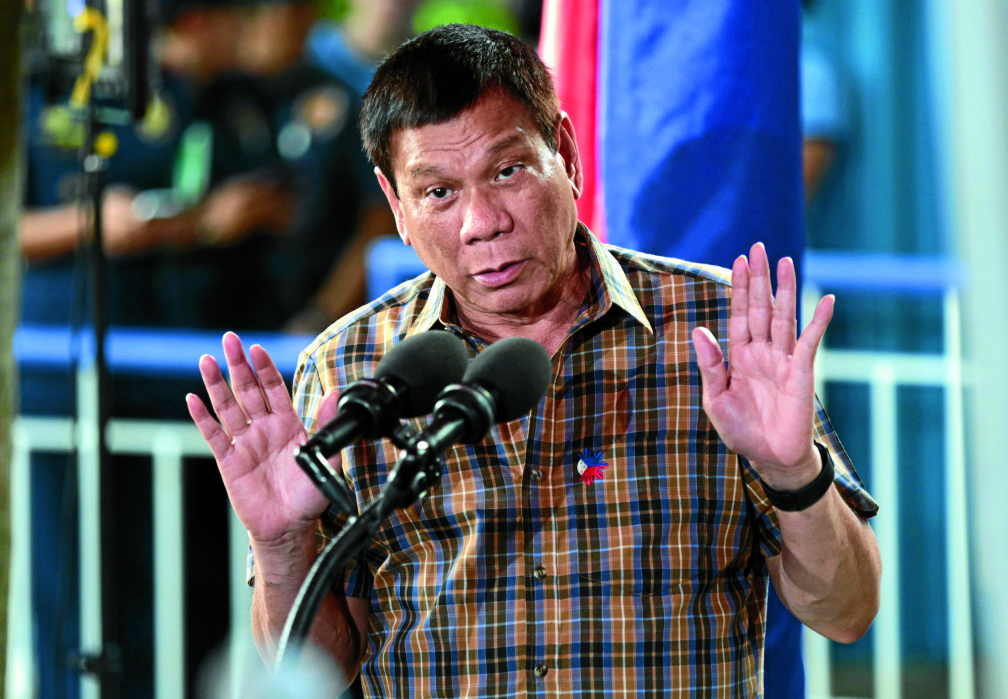Vigilante president
SYDNEY, Australia—The president of the Philippines, Rodrigo Duterte, unfortunately cannot be accused of not trying to live up to his campaign promises.
As a candidate, he declared that death by summary execution would be the preferred fate of anyone associated with the drug trade. The fish in Manila Bay, he vowed, would grow fat feeding on corpses. He cited the figure of 100,000 as an appropriate target.
Two months into Duterte’s presidency, the toll is believed to stand at about 2,000, with the nation’s police ostensibly responsible for less than half of those killings. Self-ordained vigilantes may account for some of the other deaths, but the police also freely employ contract killers.
Last week, the BBC published an interview with “a diminutive, nervous young woman carrying a baby” who is part of a female hit team valued for the ability of its members to “get close to their victims without arousing the same suspicion a man would”. She had thus far killed six people, lately under orders from a police officer.
It’s a lucrative profession, each hit rewarded with more than $400, a windfall for the impoverished and the unemployed. It’s also a trap, because there’s no easy way out once you take the plunge.
And who exactly are the victims? In his rhetoric, Duterte has often failed to make a clear distinction between kingpins, dealers and addicts. On the campaign trail, asked what he would do if he discovered one of his children was involved in drugs, the candidate spontaneously responded: “I will kill him.”
READ: If my kid is into drugs, ‘kill him’ – Duterte
It wasn’t any of his kids, though, but five-year-old Danica May Garcia who was shot dead last week when gunmen on motorbikes came for her grandfather in Dagupan City. The intended target escaped with a wound.
READ: 5-yr-old girl latest fatality in drug war
During any killing spree, the prospect of innocents getting caught up in the crossfire is almost guaranteed. Even beyond that, though, never mind the identities of those who are being targeted — be it on the basis of suspicions, rumors, innuendo or local vendettas — the very idea of state agencies blatantly playing judge, jury and executioner is exceedingly uncivilized.
It is not hard to accept that rampant trade in drugs and growing rates of addiction are a serious problem in the Philippines, as they are in so many other countries, the main culprit in this case being what is known as crystal meth or ice, locally known as shabu. But even if one overlooks the rather obvious fact that such problems are invariably at least as much the symptoms as the cause of societal malaise, a crackdown on drug dealing and manufacture should entail arrests, fair trials and commensurate punishment, while addicts deserve treatment rather than elimination.
Extreme measures reflect not so much the coercive power of the state machinery as its inadequacies. Furthermore, they tend to backfire. Not only is the Philippines likely to pay a heavy price for the state-sanctioned brutalization of society to an arguably unprecedented extent, but chances are that the scourge of drugs will not disappear either.
One cannot help but acknowledge, though, that this is what Filipinos voted for. Granted, Duterte’s landslide was based on less than 40 per cent of the popular vote, which suggests the majority of the electorate had qualms about endorsing him, but he was well ahead of his rivals. There were at least a few protests when it was indicated that former dictator Ferdinand Marcos, overthrown by a popular uprising 30 years ago, would be interred in a graveyard reserved for martyrs. But the pursuit of the ‘war on drugs’ with extreme prejudice does not appear to have elicited much of a reaction outside parliament — perhaps in part because of the fear factor.
READ: Understanding Duterte
Both during the campaign and following his inauguration, Duterte has also lived up to his reputation as an exceptionally foul-mouthed politician, with the targets of his crude tongue-lashings ranging from the Pope to the US ambassador in Manila. The Pope effectively turned the other cheek; Washington remonstrated, but only mildly — after all, the Philippines is a key Asian ally and Subic Bay is once again a regular port of call for US warships amid an unresolved, and quite possibly unnecessary, spat with Beijing over islands in the South China Sea.
Duterte is also prone to shooting his mouth off at the United Nations and threatening to quit it, but, interestingly, he has thus far not deemed it fit to publicly insult China. Perhaps he has a reasonably good idea of what he can get away with.
Parallels have inevitably been drawn between Duterte and Donald Trump, and a few of them are reasonably valid. The most potent one is that were Trump by some misfortune to be elected in November, the biggest threat to the US would be based in the White House. The Philippines has a head start: the greatest danger to the republic already resides in Malacañang Palace.
